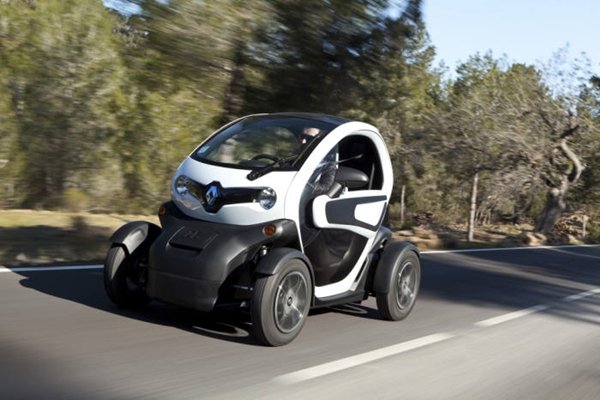Renault from France is planning to start producing some of its mini electric vehicle called ‘Twizy’ in South Korea. Rather than producing it from Renault-Samsung’s production factory in Busan, it is planning to produce it through outsourcing by selecting a separate South Korean business.
Renault is taking such measure because there are high expectations from South Korean markets towards Twizy and it plans to increase competitive edge in distribution and price through South Korean production and stabilize amount of supplies. In long-term, it is looking to use South Korean as a foothold to target foreign markets such as South-East Asia.
There is a chance that South Korea will emerge as the Mecca of electric vehicle industries because many Chinese electric vehicle manufacturers such as Beijing Motors besides Renault are also looking to produce their cars in South Korea.
According to industries on the 23rd, a group of visitors led by Eric Feunteun, who is in charge of Renault’s electric vehicle and battery business department, recently carried out inspections of South Korean businesses as it gets ready to select a South Korean business that will be producing Twizy. It has been about 4 months since Renault-Samsung proposed to Renault’s headquarters about producing Twizy in South Korea. Inspection group visited businesses that are able to do SKD (Semi Knockdown) production and checked entire present conditions of markets such as South Korean Government’s policies. Renault is going to select a business that will be producing Twizy through a public bidding during second half of this year and is going to introduce supply of 2018 Twizys that will be sold to customers in South Korea to South Korean markets.
It is believed that Renault-Samsung’s competitive edge in electric vehicles will increase due to production of Twizy in South Korea. Not only is supply and demand of many parts such as batteries from LG Chemicals favorable for Renault-Samsung but it can supplement disadvantages of Twizy such as no air conditioner and no heater through localization. It can also secure stable amount of supplies by reducing distribution cost that comes with importing Twizy that is produced from factories in Valladolid, Spain. It is also meaningful that Renault-Samsung will be able to secure major electric vehicle model when it was not able to release any new vehicle since ‘SM3 Z.E.’ in 2014.

“Consumers in South Korea are showing great responses towards Twizy as number of people who preordered Twizy surpassed 1,200 in just month or two.” said a representative for Renault-Samsung. “Although Renault’s headquarters also believes in the need to produce Twizy in South Korea in order to increase competitive edge in price, it has not made up its decision yet.”
Twizy, which was released in 2012, is a very popular electric vehicle that is mainly sold in Europe and is used as a second car for regular households and variety of fields such as car-sharing and public tasks. Although price of Twizy in South Korea is about $13,407 (15 million KRW), one can purchase it at a price between $4,469 and $7,150 (5 million KRW and 8 million KRW) if South Korean Government’s subsidy ($5,166 (5.78 million KRW)) and additional support fund ($1,108~$4,469 (1.24 million KRW~5 million KRW)) from local government groups are added.
Besides Renault, many foreign electric vehicle manufacturers such as Beijing Motors are also looking to produce their vehicles in South Korea. Electric vehicles that are produced from factories in South Korea are mainly for customers in South Korea. One can expect South Korea to become a country where major export of electric vehicles takes place if know-how of production of electric vehicles is built and if industries of parts that are related to electric vehicles grow.
South Korea has businesses such as Samsung SDI and LG Chemical that have competitive edge in batteries and is geographically favorable for testing variety of electric vehicles. Due to these reasons, Beijing Motors is currently pushing to produce its electric trucks and electric buses in South Korea. Another Chinese electric vehicle manufacturer is also thinking about constructing its factories in South Korea.
“Besides Renault, many other electric vehicle manufacturers are looking to produce their vehicles in South Korea.” said a representative for an electric vehicle industry. “South Korea is the perfect test bed since it has high competitive edge in finished products and is good for producing and utilizing electric vehicles.”
Staff Reporter Park, Taejoon | gaius@etnews.com